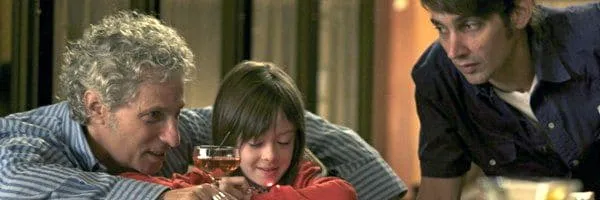 |
| David Siegel, Onata Aprile and Scott McGehee on the set of What Maisie Knew. |
The directors of the marvelous and absorbing What Maisie Knew, Scott McGehee and David Siegel, knew what they wanted with Henry James, Onata Aprile as Maisie, and the relationship to her rock-star mother played with rock-star style by Julianne Moore. Alexander Skarsgård, as Lincoln, the mother's new husband turns a visit to Turtle Pond in Central Park into a pivotal turtle purchase in Chinatown.
My conversation in midtown Manhattan, led us to Tilda Swinton, Little Red Riding Hood, Virginia Woolf, and Ana Torrent from The Spirit Of The Beehive, swarming around disclosures of what it means to continuously grow up.
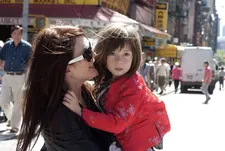 |
| Susanna (Julianne Moore) with Maisie (Onata Aprile) |
Anne-Katrin Titze: Waiting for this interview, I was debating with myself if I should start with a question from the outside in or from the inside out - with the costume design for Julianne Moore and Onata Aprile or with the Henry James notebooks in which he describes the essence of What Maisie Knew. Where do you want to start?
Scott McGehee: You are smarter than the average bear! The notebooks - I don't know if we have anything to say about that.
AKT: Let's start with that then. I was looking up in the notebooks when Maisie first appeared. On November 12, 1892 James was at a dinner and had an idea. Then he came up with a two part essence. I think you capture both perfectly in your film. One: everything takes place in front of Maisie, and two: 'the tenderness she inspires'.
SMG: That's really nice. We read about Henry James at a dinner party first hearing about joint custody. That was supposed to be the inspiration for him writing on this. Joint custody was such an outlandish idea to him. He never heard of such a thing. It sounded like a terrible idea, bad for children, bad for everyone. He couldn't believe his ears that that was going to be someone's approach. That starting place had always seemed interesting to us. Joint custody is the most common thing in the world now. But we hadn't heard about the two pieces that would be the essence.
AKT: Your film possesses these qualities.
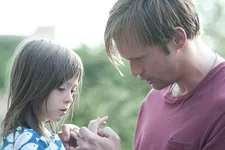 |
| Lincoln (Alexander Skarsgård) with Maisie (Onata Aprile) |
SMG: It's interesting that not having known that, you get that from his book. Obviously nothing takes place when Maisie is not present. That's easy. But that essential tenderness does come through in his book so much. And it came through in the screenplay [by Nancy Doyne and Carroll Cartwright] that we read. And thank you very much for telling us that that came through in our movie. Because that was something we very much talked about with our whole crew. How to keep that sense of tenderness present from the lighting to the costumes.
AKT: And the casting, of course. You needed a Maisie who could carry all of that.
David Siegel: We looked for a long long time for a child to play Maisie and we weren't having so much luck. We had a very fine casting director, Avy Kaufman. We were less than a month from shooting, so the whole train was moving already. We were getting a little panicked about it. Avy was extremely calm and she just kept saying 'you're going to find the perfect girl'. One day she called us very excitedly and said 'you need to see this child.' There was something about Onata that was very attractive and I don't mean physically attractive.
AKT: That as well, though.
DS: She was very cute. But she is not gorgeous like one of those model-ly children.
SMG: We met some of them, you know, perfect-angel-kids.
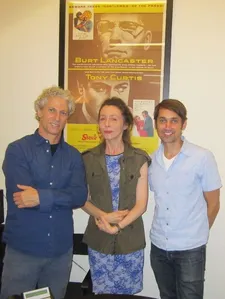 |
| David Siegel, Anne-Katrin Titze and Scott McGehee. Photo: Monica Delamater |
DS: There was something in the way she looks around and fiddles with things. You just kind of lean toward her.
SMG: There's a kind of mystery about her.
DS: About her face, a depth. There's a sense that something's going on.
AKT: Her performance reminded me of Ana Torrent in The Spirit of the Beehive (1973).
DS: That's a movie that we talked about. You feel that in that film as well. This might sound like a strange thing to say, but our experience of working with Tilda Swinton on The Deep End (2001) - we had the great privilege of watching someone and working with someone who has that ability to convey an interior life through her face. Proceeding with the casting of Maisie, we would say often, we need that. We need to feel that we're going inside. Scott was saying that there's a mystery or a wonder about her. You ask yourself, what is it that child is thinking and then begin to believe that you understand what it is.
AKT: Víctor Erice, the director of The Spirit Of The Beehive told the story of how he came to cast the six-year-old girl. He noticed her sitting by herself while the other kids were playing and asked her if she knew who Frankenstein was [an important reference in his movie]. Ana Torrent responded with: "No. But I sure would like to meet him." That convinced him.
SMG: That kind of openness to the world is a special thing.
AKT: The costumes [by Stacy Battat] of mother and daughter mirror each other in a really interesting way and that says so much about their relationship. The little boots, the tights, the short skirts, you have a big story there without a word of dialogue necessary.
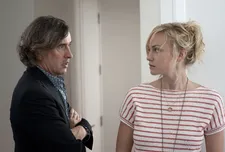 |
| Beale (Steve Coogan) with Margot (Joanna Vanderham) |
DS: We talked about that a lot. What are the kinds of ways we can demonstrate without dialogue that sense of desire for Maisie to have a relationship with her mother. And it goes the other way as well because her mother is buying her clothes. She's not buying her own. But she chooses her clothes. We see her choosing her clothes. That in itself conveys something in terms of what that urge is or that desire is.
AKT: That is the six-year-old wanting to look like the mother, to please her.
DS: In a way you want to be her, right? You want to push yourself back into the body of your mother. You want to hold on to that.
AKT: You convey all of that through the costumes. Maisie doesn't do that with any of the other adults she has strong relationships with. For example with Lincoln [ the mother's new husband, played by Alexander Skarsgård], she shows him how to properly cross the street with a six-year-old. Was that scene in the screenplay?
SMG: Yeah, that was in the screenplay. In casting Lincoln and thinking about that scene, imagining Alexander Skarsgård with this little tiny girl - that was one of the great pleasures we imagined of having him in that role. When a really big guy gets to be gentle in that particular way - it came off quite as we imagined from reading the screenplay, I think.
AKT: Every child's worst nightmare is overhearing your parents plot to get rid of you, just as in Hansel And Gretel. Maisie overhears a lot of fighting and she doesn't have a brother. You have a scene where Maisie watches a puppet show of Little Red Riding Hood, a very feisty Red Riding Hood, who beats the wolf up.
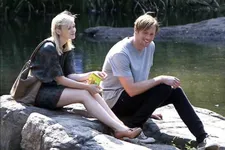 |
| Margo (Joanna Vanderham) with Lincoln (Alexander Skarsgård) at Turtle Pond in Central Park |
DS: That was a little bit of luck with the puppeteer, Bruce Cannon, from the puppet theater in Central Park [Swedish Cottage Marionette Theatre]. He's amazing. He worked there for 25 years, or something like that. He was sent to a kind of program because he was sort of a troubled kid. His mother, as a way of giving him purpose, sent him to this program in New York City where one option was to work in the puppet theater. And thirty years later, he runs the puppet theater. He has this amazing life and success and is still very much like a kid from the streets in a way. He helped us figure out what to do with Little Red Riding Hood.
SMG: That scene in the puppet theater hadn't been in the screenplay that way. So we imagined that and when we met him he took us backstage and showed us all the puppets.
AKT: Lovely way to show New York. Together with Turtle Pond [also in Central Park] and buying a turtle in Chinatown. The ending takes us outside the city. I was thinking of another literary work - Virginia Woolf's To The Lighthouse.
SMG: That's been a long time for me…
DS: I never read To The Lighthouse.
AKT: The reason for me to bring this up is that in the novel there's a promise given to go to the lighthouse that is never fulfilled. The place at the end of your film doesn't have a lighthouse, does it?
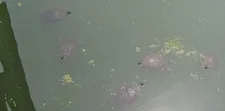 |
| Turtle Pond in Central Park. Photo: Anne-Katrin Titze |
DS: No. But she gets to go there!
AKT: Exactly. It's like a rewriting for the child. It's about promises and your film, too, is about how important it is for a child. It forms you, if promises were kept or not.
SMG: That's really lovely. I like that a lot.
DS: I'm going to read To the Lighthouse. I've got to write this down. We thought a lot about the ending of the movie. The very final scene between Julianne Moore and Onata, where Maisie for the first time is able to say to her mother, 'I actually need this'. Julianne was really helpful in rewriting this based on the sense that she was afraid of her. The idea that that allows Maisie forward motion. We didn't want her to get to the lighthouse. We just wanted to show that she has the opportunity to move towards the lighthouse.
AKT: Another core in child development you touch upon with the sleepover scene. The little girl realizes that her 'normal' is frightening to someone else.
SMG: That is exactly what we wanted to do with that scene.
DS: I'm really happy that you framed it that way. People asked us before how did we identify personally with the story. Is there anything autobiographical about it? There isn't really very much autobiographical in it. My parents divorced when I was in college and for Scott's parents that wasn't the case. But that experience - because I came from a crazy family, a pretty crazy family - that feeling that my normal is not only different but not so good… I'm having a bit of a moment here.
What Maisie Knew hinges on how expectations of stability form what we may become. A walk on the beach, a game of monopoly, a promise fulfilled, these are the kinds of memories that we all carry with us, entrapped in a glass heart, the one only parents are able to shatter.
What Maisie Knew opens in the UK on August 23 and became available in the US on DVD and Blu-ray(TM) Combo Pack this week.
























